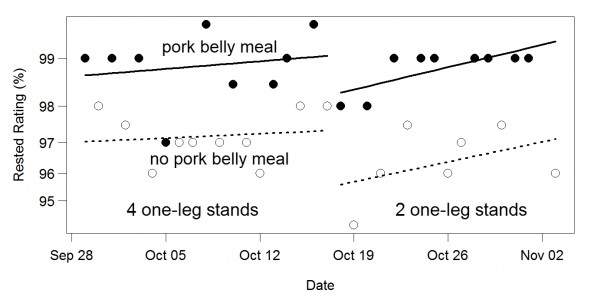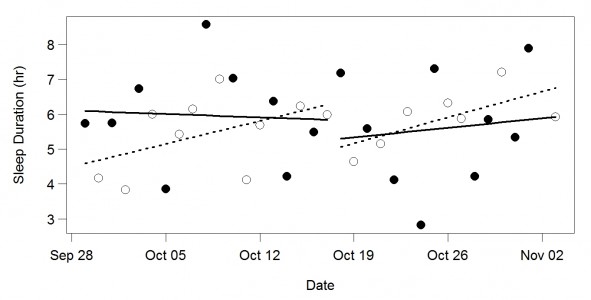A German study published in 2001 measured the effect of starkly different breakfasts (all fat, all protein, or all carbohydrate) on cognition during the next hours. Participants (17 men in their 20s) ate the same packaged dinner at home and next morning came to the lab and ate different breakfasts. All of the breakfasts were “cream-like” and all contained 400 calories. The design was relatively sophisticated. Practice effects were reduced by giving considerable practice with the tests before the main measurements began. Brain tests included a simple reaction time task, a choice reaction time task, and a “combi-test” in which the subject does two things at once that provides six measures of performance. One set of tests took 15 minutes. The tests were done once/hour for 3 hours after the breakfast.
The simple reaction time test showed no difference between the breakfasts. The choice reaction time test and the combi-test did show differences: The all-fat breakfast was better. The improvement produced by the fat breakfast compared to the other two breakfasts was clearest about two hours after the breakfast.
EMG (brainwave) measurements showed no differences between the breakfasts.
These results agreed with previous work.
Cunliffe et al. (1997) reported that a pure fat meal did not increase reaction times in contrast to carbohydrate ingestion when measured hourly for 4 h after the meal. In our study, fat ingestion even improved reaction times compared with baseline. Our subjects scored best for all tasks of the combi-test after the fat meal. This finding is in line with the higher accuracy of a focused attention task after a high-fat meal compared with a low-fat meal reported by others (Smith et al. 1994).
The “fat” breakfast in this study was 25% soybean oil (high in omega-6), 25% palm oil (high in saturated fats) and 50% cream (high in saturated fats). I have not compared omega-6 to nothing but I suspect it would produce worse results, given that olive oil appears worse than nothing. So I suspect that the improvement due to fat was due to the palm oil and cream. I concluded, based on evidence that I and others collected, that butter (high in saturated fats) improves arithmetic speed. I usually ate 30 g (= 2 tablespoons = 270 calories) of butter twice/day. Close to the dosage of this experiment. The timing of the effects I saw (sharp improvement from one day to the next) is consistent with a change that happens within 2 hours.
These results, which I didn’t know about until recently, support my earlier conclusions about butter. My measurements cost almost nothing whereas this experiment must have cost thousands of dollars ($400/subject?) plus hundreds of hours of researcher time. Maybe I should compare cream and butter. Cream has advantages. Mark Frauenfelder suggested using cream to make yogurt. Superfood!
A more recent study found saturated fat consumption correlated with cognitive decline. It was a survey, however, with many differences between the groups being compared. I trust experimental evidence much more than survey evidence.

